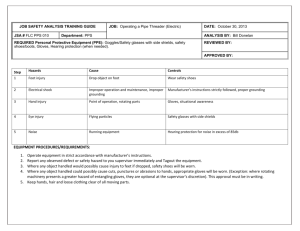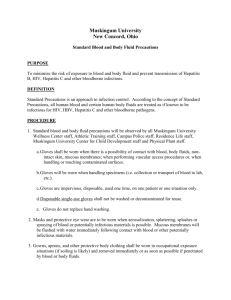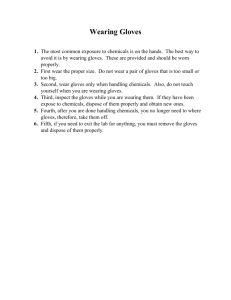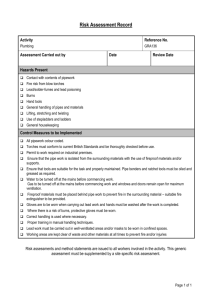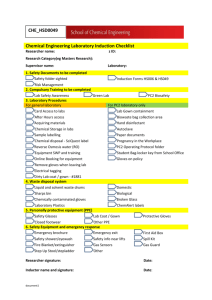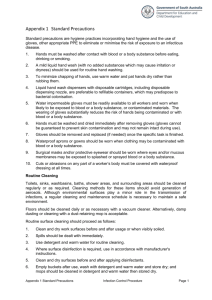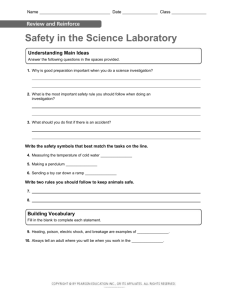Employee Handbook
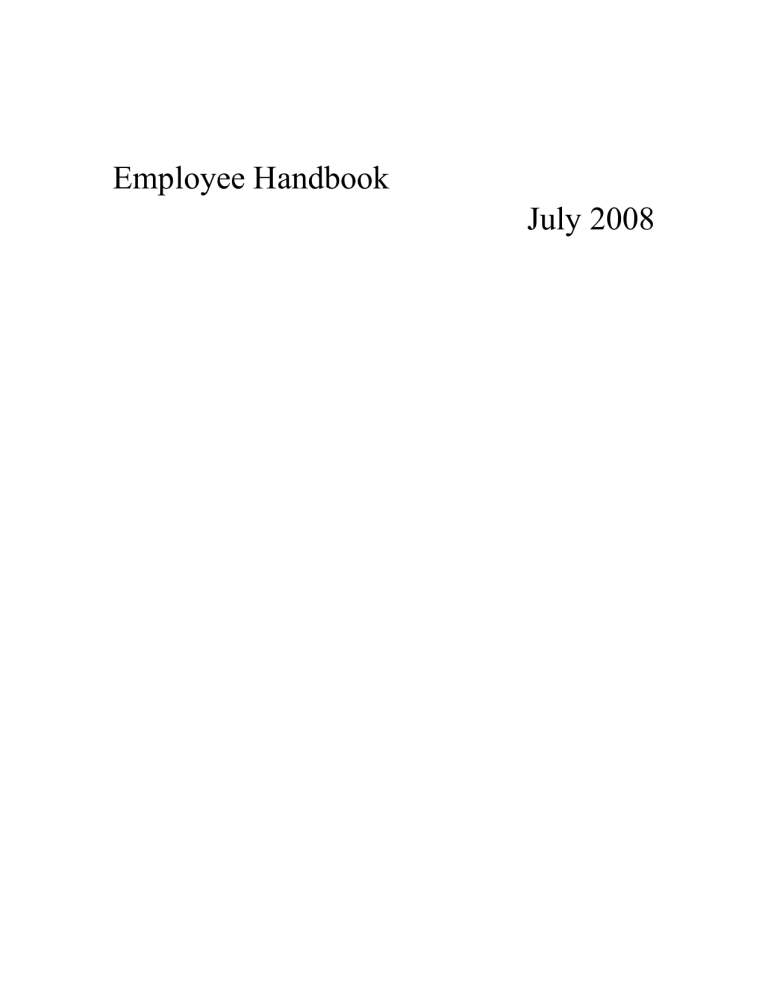
Employee Handbook
July 2008
UNIFORM STANDARDS
Smocks / Gloves
All employees must wear clean, properly secured smocks, hairnets and gloves at all times in the plant. They shall be changed daily.
REASON: Dirty smocks may carry bacteria or other microorganisms. These can easily be transferred to the food product by contacting food preparation surfaces, equipment or packaging materials.
Smocks shall be sufficient to cover all personal clothing, as far as possible. Shirts may not be ripped or frayed, all shirt sleeves must not hang lower than the sleeve of the smock. When wearing a shirt that has a hood the hood must be contained under the smock.
REASON: Personal clothing has been worn outside the production area and has been exposed to unknown conditions. More than likely, it will carry microorganisms that can be transferred to the clean smocks and indirectly transferred to the food product in the plant.
At NO time smocks shall be worn outside the food processing area. Smocks, hairnets and gloves must be removed before using washroom facilities and before using the lunchroom.
REASON: The food processing area is considered a “clean room”. All precautions must be taken to keep microorganisms and pests out of this area..
Top pockets on the smock are to be kept empty.
REASON: Articles put in the top pockets, such as pens, can easily fall out and contaminate the food product.
Gloves must be maintained in sound, clean and sanitary manner. Gloves shall be washed and disinfected frequently throughout the day. Wearing of gloves does not exempt the employee from washing their hands.
REASON: Clean hands and gloves will minimize the risk of transferring microorganisms onto the food products.
HairNets / Beard Nets / Particle Masks
Hair nets must be worn at all times in the production area. All hair must be covered to prevent any possible contamination of food product.
Males are to be clean-shaven. Employees with any facial hair (beards or mustaches) must wear beard nets.
Employees must wear particle masks or beard nets to cover the whole nose and mouth while working with cooked products.
- 2 -
Footwear
All employees must wear work place shoes with non-skid soles and steel toe. Protective footwear must be easily cleaned and maintained in a clean condition, consistent with the nature of the work in which the employee is engaged. Steel toed shoes or boots are mandatory, as you will be working around/with a fork lift and pallet jacks. Please see attached footwear policy.
Work shoes must not be worn outside the plant.
REASON: Footwear worn outside the plant can pick up microorganisms or dirt and transfer to the production area.
Jewelry
NO jewelry, earrings, bracelets, rings or watches, except for medical alert necklace and/or bracelet, is allowed to be worn in the food handling area/production area. Medical alert necklace and/or bracelet must be covered completely. Plain wedding band is allowed but has to be protected by the gloves. Any other religious bracelets that cannot be removed have to be protected by taping and covered by protective work gear. Personal effects and coats etc., are to be kept in the lockers provided.
REASON: Jewelry can easily fall into food products. It is very hard to clean and may carry microorganisms on the surface or in the crevices. Jewelry can contaminate food products as well as a safety hazard to the customer.
Hats / Make-up / Perfume
Hats are not permitted.
Makeup is to be worn in moderation.
Perfume is not to be worn on your wrists.
- 3 -
GOOD MANUFACTURING PRACTICES
Overview
The principles of food protection begin with the individual worker. The “human element” is the single most important factor in the control of food-borne illness and food spoilage. Good personal hygiene, work habits and physical health of food production personnel are critical.
Personal hygiene is important to the food production employee. Good personal hygiene prevents spreading of microorganisms responsible for food spoilage.
Because we manufacture food products, it is extremely important that everyone is fully aware of the requirements and expectations regarding Good Manufacturing Practices and hygiene.
Washing of Hands
Employees working in the food handling area must wash and sanitize their hands / gloves frequently and thoroughly. Water that is as warm / hot as can be tolerated should be used in washing hands and gloves. Employees that are handling the food products must wash their hands before entering the food processing area; then gloves must be put on and washed and sanitized also. Hands / gloves must always be washed:
Before commencing work.
Immediately after using the washroom.
After handling contaminated item (e.g. dirty utensil, skid, garbage, etc).
After eating or drinking.
After smoking.
After touching nose, mouth, skin or hair.
After sneezing, coughing or blowing the nose.
REASON: Food will be contaminated by unclean hands / gloves more frequently than by any other means. Bacteria are found everywhere. Hands / gloves are continually coming into contact with food.
Work Area Habits / Personal & Plant Hygiene
Insubordinate conduct or refusal to follow management’s instructions will not be tolerated.
No employee shall smoke, chew tobacco, chew gum, candy or spit in the food processing areas. These could result in contamination of food products. Violations of these will be dealt with accordingly.
No product shall be taken from the production area to be eaten by an employee. Taking product from the production area to be eaten in the lunchroom is not permitted.
No employee shall return product that has come in contact with contaminated surfaces (e.g. floor). Depending on the amount of such products, these should be weighed and recorded before being discarded.
At no time during production shall any containers with or without food materials or products be placed directly on the floor. These should always be at least six inches above the floor.
Hands / Gloves that have been in contact with contaminated surfaces (garbage, inedible food totes, floor, etc.) must be thoroughly cleaned by following proper hand washing procedure.
- 4 -
(Rub soap on and around hands for 30 seconds, thoroughly rinse with hot water, dry with paper towel and rub hand sanitizer on and around hands.
Production line workers handling raw foods shall not wear the same smock and gloves in handling cooked foods.
No person shall walk on pallets. Pallet must not lean against wall or skid of food product or packaging material.
No person shall stand or sit on a pallet or on the products.
After using the washroom facilities, all employees must wash their hands properly before returning to the work area.
Smocks, hair nets, gloves, and particle masks/beard nets are not to be worn into washrooms, locker rooms, and lunch rooms or outside the building.
No employee, while known to be infected with a disease likely to be transmitting through food or while afflicted with infected wounds, skin infections and sores or with diarrhea, is permitted to work in any food handling area in capacity in which there is any likelihood of that person directly or indirectly contaminating the food with pathogenic organisms.
Any employee who has an open cut or wound will not be permitted to handle food or food contact surfaces until the injury is completely protected by water proof covering which is firmly secured.
All employees having direct contact with food or food contact surfaces, will clean and sanitize their hands before commencing work.
Fingernails must be trimmed short and you are not permitted to wear nail polish at anytime.
Jewelry must be removed prior to working in a food handling area as prescribed under
“Uniform Standards”.
Do not cough or sneeze around food or a food preparation area.
Use only disposable tissue to control coughs and sneezes and wash your hands with hot water and antibacterial soap before commencing work.
Keep your hands away from your mouth, nose, ears and hair.
Lunchroom must be kept clean and tidy at all times. All employees are expected to be considerate of others and clean up after themselves.
All garbage should be placed immediately in garbage containers, not thrown on the floor. A
CLEAN-AS-YOU-GO policy means that workspace should always be kept neat and sanitary while working. All supplies must be returned to their original places when you are done using them!
All employees are responsible for reporting to Quality Assurance on any sightings of pests or rodents in the plant.
- 5 -
Totes / Buckets / Utensils
Totes and buckets are to be washed and sanitized thoroughly before usage.
Food products stored in totes and buckets must be fully covered at all times.
All utensils are to be washed and sanitized before use, and are to be kept in clean and sanitized containers.
All utensils (e.g. knife, scoop etc.) must be stored in a sanitary condition when not in use.
Spices and Spice Room
Spices are to be weighed in the Spice Room, not in the processing area.
Use designated scoops for handling each allergen (e.g. milk powder, etc).
Allergenic ingredients are not to be stored on top of non-allergenic ingredients or nonallergens. Full bag of allergenic ingredients must be stored on a separate skid in the warehouse.
Open bag of spice must be transferred to plastic container or taped closed. This includes ingredients stored in the dry storage area or in Spice Room.
Paperwork
All paperwork must be completed, signed and handed in. Paperwork is to be kept as clean as possible.
- 6 -
Preparing Food
Upon entering the production area, hands must be washed immediately, before commencing any work. Hands should be washed frequently throughout the day to avoid cross contamination (ex. After handling garbage, between handling different products, etc.)
Handle food as little as possible (use scoops, tongs, spoons, cups, etc.)
Do not combine old food and new food items.
Use only clean and sanitized dishes.
Keep your work area clean. Wipe down with a sanitizing solution when finished a food prep item.
Refrigerated items are to be returned to the cooler as soon as you are done using them. All finished products must also be refrigerated as soon as production is complete.
Cover, date and refrigerate food items immediately and rotate! Rotation of stock is very important; our policy is to rotate stock when we receive it, from time to time stock does get moved around. As a production worker part of your responsibility is to ensue that you are using the oldest product first. Follow the principle of FIFO: First In – First Out!
Do not place containers on the floor.
If you see or smell something that you are not sure of take that product or situation to
Production Manager or Quality Assurance Manager immediately.
Our customers demand consistent high quality products from us in every batch we make. As a production worker, you will be the first person to see any problems with ingredients, packaging, or other quality concerns. It is your responsibility to bring any concerns to the attention of the
Production Manager or the Quality Assurance Manager. If you are unsure as to a procedure or recipe ask you supervisor immediately for clarification.
- 7 -
I have read and understand everything in the employee handbook.
I understand that I can see my Manager at anytime to explain to me the policies, procedures and terms of Employment.
New Employee
Name: __________________________
Signature: __________________________
Date: ____________________________
Verified by:
Name: __________________________
Signature: __________________________
Date: ____________________________
- 8 -
